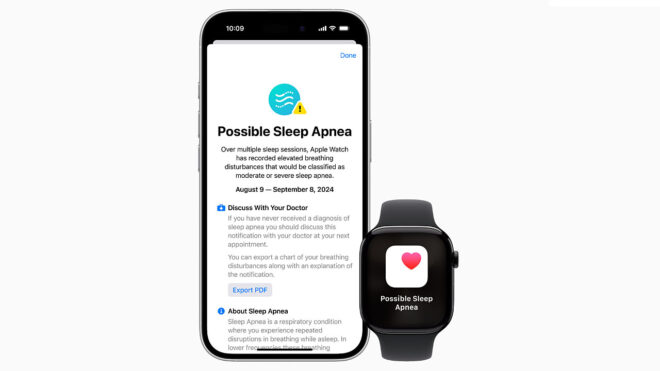Apple Watch feature sleep apnea notifications is available in Turkey. This feature is currently available in more than 150 countries and regions.
The statement from Apple Turkey on this subject was as follows: “Starting today, a new Apple Watch feature that will help detect moderate and severe sleep apnea symptoms is available in Turkey. Apple received marketing authorization from the Turkish Medicines and Medical Devices Agency for its sleep apnea notifications feature. Sleep apnea is a health problem in which breathing stops repeatedly during sleep and can have serious consequences. This health problem, which is estimated to affect more than 1 billion people worldwide, often goes undiagnosed. If left untreated, sleep apnea can lead to significant health problems, such as high blood pressure, Type 2 diabetes, and risk of heart problems. To detect sleep apnea, Apple Watch uses an accelerometer that tracks tiny wrist movements associated with interruptions in normal breathing patterns, and these interruptions are measured by the new Respiratory Disturbance metric. While some breathing disturbances are normal, tracking this data helps users understand whether they slept well throughout the night and whether frequent breathing disturbances over several nights may be related to sleep apnea. In the Health app on iPhone and iPad, users can view overnight Respiratory Dysfunction data, classified as elevated or non-elevated, for one-month, six-month or one-year periods.
YOU MAY BE INTERESTED IN
Respiratory interruption data is analyzed every 30 days. The user is informed if the symptoms of moderate and severe sleep apnea are consistent. Thus, users can consult their doctors about the steps to be taken, including possible diagnosis and treatment. This notification includes educational materials about the time period in which possible sleep apnea occurs and the importance of treatment, as well as a PDF containing the last three months of respiratory distress data that users can share with their doctors, notification details and additional information.
The sleep apnea notification algorithm was developed using advanced machine learning and a comprehensive dataset of clinical-grade sleep apnea tests. This feature was confirmed in a clinical study of unprecedented size for sleep apnea technology. “In the clinical validation study, each of the participants identified by the algorithm had at least mild sleep apnea.”
